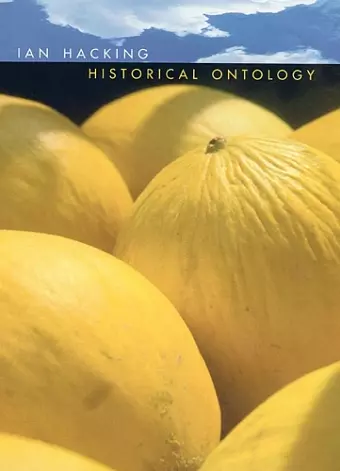Historical Ontology
Format:Paperback
Publisher:Harvard University Press
Published:15th Oct '04
Should be back in stock very soon

With the unusual clarity, distinctive and engaging style, and penetrating insight that have drawn such a wide range of readers to his work, Ian Hacking here offers his reflections on the philosophical uses of history. The focus of this volume, which collects both recent and now-classic essays, is the historical emergence of concepts and objects, through new uses of words and sentences in specific settings, and new patterns or styles of reasoning within those sentences. In its lucid and thoroughgoing look at the historical dimension of concepts, the book is at once a systematic formulation of Hacking’s approach and its relation to other types of intellectual history, and a valuable contribution to philosophical understanding.
Hacking opens the volume with an extended meditation on the philosophical significance of history. The importance of Michel Foucault—for the development of this theme, and for Hacking’s own work in intellectual history—emerges in the following chapters, which place Hacking’s classic essays on Foucault within the wider context of general reflections on historical methodology. Against this background, Hacking then develops ideas about how language, styles of reasoning, and “psychological” phenomena figure in the articulation of concepts—and in the very prospect of doing philosophy as historical ontology.
What, asks Ian Hacking in Historical Ontology, do I mean by live skepticism? His answer is that it is desirable to be ‘genuinely in doubt and terrified that one’s doubt might be warranted.’ It’s a healthy position for an enquirer into how new concepts and objects emerge in the province of philosophers and inventors, the novel uses of words and new ways of reasoning, and new interplays of power and knowledge. His essays demand attention and close reading. -- Maggie McDonald * New Scientist *
[Hacking] focuses on the interactions between what there is (or comes to be) and our concepts thereof. The kinds of objects he considers, both of which he regards as historical, are Aristotelian universals and their instances. He emphasizes that not only do ordinary physical objects and people and their institutions begin, develop, and end, but so do concepts, e.g., those language, knowledge, a child, (psychic) trauma, and scientific reasoning… Stimulating, incisive, and clear even in expounding theories of unclear writers. -- Robert Hoffman * Library Journal *
ISBN: 9780674016071
Dimensions: 229mm x 152mm x 18mm
Weight: 408g
288 pages